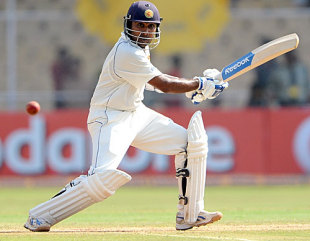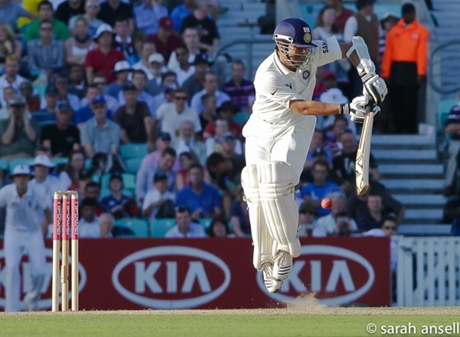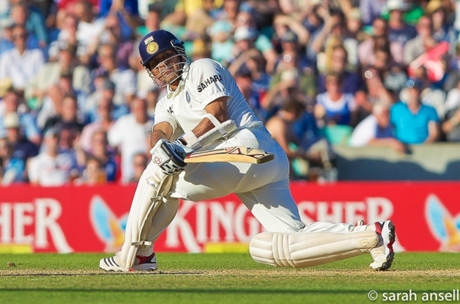Twenty years, can you recount some of the poignant moments, or highlights?
The first and most important moment I'd like to remember right now would be the day I wore my India cap first. It was a dream which had come true, so I was on cloud nine. It was an absolutely fabulous feeling. After that there have been many but the most important one was that. Because growing up as a child the dream was to play for India, and nothing was bigger than that for me, and it continues the same way for me today. I think I'm very fortunate to be living that dream, and 20 years is a long time so there have been many special moments. To actually start counting them would be tough, but I'd definitely say the first day, walking with the playing XI, playing a Test in Pakistan was probably the greatest feeling. The journey began there, and whatever I did after that was a mere reflection of my contribution towards the nation's cause.
What do you remember of the first tour apart from the cricket?
A couple of times we went out shopping, and then obviously interacting with the media because we were not going out much - hardly once or twice in 40-45 days - it's a long time to be in the hotel. We used to have this "Sunday Club", and the media also joined the entire team and we were dressed differently. I was with a moustache, and it was a bit hard to believe for a 16-year-old to have a thick moustache and lipstick and that kind of thing, so it was party time and that's something which I remember because there were so many pictures taken, and every now and then you see them. Other than that I felt the tour was tough and we played some terrific cricket. Over the four Tests it was a drawn series, and I felt that there was no dull moment in the entire series. Lahore was the flattest track where nothing much happened off the wicket, but otherwise the remaining three surfaces we played on had a bit of life, bounce, pace and the cricket was also entertaining.
How have you managed to change with the times? How difficult was it to do that?Since 1989 plenty of things have changed in the game; that includes the introduction of the third umpire, the hot spot and various things, the introduction of Twenty20. The most noticeable change I feel is because of Twenty20. We've seen plenty of innovative shots, which are occasionally used in Test cricket. In one-day cricket batsmen are backing themselves to try something new, also occasionally in Test cricket. So in a one-day match the average score has definitely gone from 210 to now 265-270 as a par score. To make 265 on a decent surface is not a great score as such.
Also, in Tests you see more results now. There was a phase where you used to hear that Test matches are getting boring because there are no results, but I don't think that is the case now. There are results in virtually every match, and that is probably because it is played more aggressively and batsmen are willing to take more chances. With time I have also changed, and everyone sitting in this room, we've all changed for the better. And I've tried to make myself a better cricketer. There is always room for improvement, and I've always believed that whenever I go out and practise, there has to be a purpose. The process continues, it's never-ending because every day there is a fresh challenge and you need to be on your toes. You've got to be moving forward, and that is what I've tried to do.
How do you stay on your toes for 20 years?
It was definitely a lot of hard work and there are certain things that all sportsmen have to follow: dedication, discipline, your focus on the game, your priorities in life. All those factors are extremely important, and for me I felt I was very lucky to have a family like [I do]. My brother always guided me, my father always supported me, my mother always fed me well. There's this combination of inner forces contributing in different directions. Mother doesn't understand much about cricket, but she prays for my success and India's success, so all these things are important. Long discussions with my brother on cricket and then support from the other brother and my sister - I represent all of them when I go out to the middle, but then there are those difficult moments which I feel are challenging, and [I wonder] what should I be doing in these moments, and that is what I share with my wife, my entire family, and that is one reason I've been able to last for such a long time. I cannot fail to thank the people of India for all the affection and love, the support. Whatever I do, whatever level I perform, you need people around you to share your happiness with them and I've got more than a billion people to share that with, so that means a lot to me. Because of all these things you are inspired to go out and do something special for all the people.
Has it been hard to stay humble over the years?
Well I've not made any effort to stay humble, it's just my upbringing. In the early stage of my career when I hadn't played for India, I was just playing school cricket, I was still scoring a lot of runs but nobody got carried away in my family over success. It's quite easy for a 12- or 13-year-old boy to get carried away when he sees his picture printed in the newspaper, because it's something special, but that is where I felt my family made sure my feet were on the ground. We always celebrated by distributing sweets, it wasn't very fancy, and that was where it stopped. Everyone was happy and enjoyed that moment, but the next day was what happens in the next game, and how do you get better in the next game, and that process has continued. That's something which has kept me grounded, and needless to say, just watching my father - my father didn't teach me - but just looking at him and watching him closely I picked up a lot of things, and the most important thing he told me was: "It's your nature which is going to stay permanently with you, the rest will come and go."
David Boon tells a story about you asking him for advice on facing West Indies. Can you elaborate on that?
David Boon… When I was in Australia in 1991, I hadn't played many West Indian fast bowlers. The only time I had played a West Indian was when we played county cricket against Derbyshire (in 1990) when Ian Bishop was there, and I played one exhibition game in Canada against West Indies. But other than that in an international match I hadn't played a West Indian. In Australia we were playing a triangular series where West Indies joined us and they had some terrific players, world-class fast bowlers. I'd watched Boon quite closely, and I thought I should be picking up things from the top players in the world and I wanted to get as much information as possible and become a better cricketer. I thought it was a good chance to speak to him, and get to know how to face certain bowlers on Australian tracks.
| 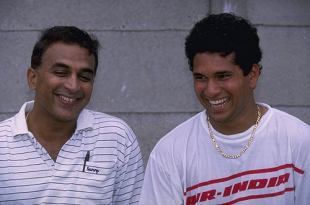
Sunil Gavaskar has been one of the people Tendulkar has looked to for advice © Getty Images
| |
|
Who has been the biggest influence on you as a player?
I think it's my brother Ajit, with whom I discuss a lot of cricket and he knows my batting possibly better than any other person in the world, and he understands my mindset as well, so I talk a lot with him. Then there are the other players from India. Sunil Gavaskar and Ravi Shastri, they travel with us whenever we're out there playing, it's good to have them there to share an opinion or get their views on how we are playing as a team and an individual. That has helped over the years, and there have been so many other senior players who have been coaches, so all those guys have been helpful. As far as help and guidance is concerned, there hasn't been an instance where a senior player has said I'm not interested or I've not been watching you and don't want to share any opinions. They've always been helpful and shared their ideas, which has played an important role.
Regarding practising with purpose, one of the more celebrated instances was having legspinners bowl at you into the rough from round the wicket before you faced Warne in 1998.
In 1998 I prepared differently, we were practising in Chennai and before that I practised in Mumbai. All my Ranji Trophy colleagues, I used to ask them to bowl round the wicket into the rough, because that was something which I hadn't faced for a long time. In spite of having been around for almost nine years at that stage, I hadn't played any legspinner that would bowl round the wicket in the rough, so I made all the bowlers do that. Then when we went to Chennai, Laxman Sivaramakrishnan bowled to me. He gave wonderful practice. So all those sessions really helped and the purpose behind that was just to get used to those angles and the areas, and identify which are the areas from which I can attack and which are the areas I need to defend.
Between Warne and Murali, who did you consider the most dangerous and why?
I'm of the opinion that if someone goes past 500-600 wickets, how do you differentiate? Both guys are special, both are match-winners and both are world champions. I would not like to pick one, I believe in respecting an individual's strengths, and the way they both have motivated youngsters in various parts of the world is just incredible. I would just sit back and applaud them.
| |
|
|
|
| |
| I requested both Azhar (the captain) and Ajit Wadekar (coach) to "just give me one opportunity. I'm very confident as in the first 15 overs I can play some big shots. I feel I'll be able to deliver. And if I fail I'll never ever come to you again". caption: How Tendulkar got to open the innings in one-dayers. He blasted a 49-ball 83 in his first try |
| |
|
|
|
|
If they were both bowling at either end, who would you rather not face?
I think I would probably go and sit in the dressing room [laughs].
Tell us about the time you were hit by Waqar [Younis] ]in 1989.
I still remember that incident. Ajit had come to watch me for the first time. I could see him sitting in front of the dressing room. India were in a fragile position in the second innings at 39 for 4 with a day and half still left when I got hit on the nose. Even before that I had been hit on the nose in school cricket on bad practice wickets, an experience that had got rid of the fear. So when I was hit by Waqar, that got me more competitive and I decided not to move from the middle and I would continue to fight.
In 1989, before you played Pakistan, there was speculation you might be picked to face the West Indies, did you think at that time that you were ready?
I remember the late Raj Singh Dungarpur was the chairman of selectors at that time, and we were playing Ranji Trophy semi-finals against Delhi in Mumbai and he walked up to me and said, "I know there has been talk and there've been articles in the papers that you may go to West Indies, but I want to tell you that you won't be going because we still feel that it's too early and it's important for you to prepare for your SSC exams." So I did that. Before that also I'd known him for quite some time. So his guidance and encouragement meant a lot to me, and what he said was: "There'll be Irani Trophy, I'm sure you will be a part of it, and go out there and enjoy yourself, give your case, and good things will happen."
What was different about batting at international level or did you just find that this was too easy?
Nothing is easy and you have to work hard for it. I'm a person who hates taking anything for granted, I want to prepare to the best of my ability. I was always confident about my ability. I wanted to go out and express myself to the best of my ability, and if the pre-match preparation was good then I was in a position to go out and deliver, and that is something I focussed on. Even today I do that. There may be innings where you don't do well, that's fine, but as long as you have given 100%, that is what matters to me. That is something which has been happening right from my school days.
I realised early that I could hit every ball, in school cricket and to a certain extent in Ranji Trophy, I would go out and attack, but after going to Pakistan and New Zealand, England, Australia, those first few series and also South Africa, it taught me a lot. It taught me to be more selective, taught me to build an innings, and also taught me to respect bowlers. I think to respect a bowler when he's bowling very well is a wise thing to do, which I learned, and it's something which happens with age and experience. You need to have that exposure, and I felt that the first few tours really helped me.
| 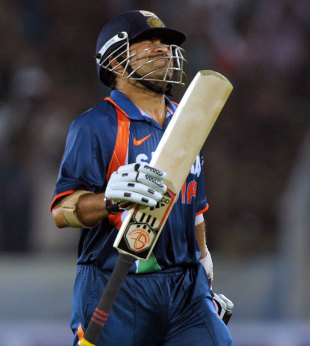
"Yes you feel bad because I've done well but the team hasn't well. So you are not excited and you cannot share that wonderful moment with people because you've lost the game" © Getty Images
| |
|
How have you separated your cricket from everything that happens around you?
I don't know, cricket lives in my heart and whenever I'm on a cricket field I enjoy it, and somewhere there's still a 16-year-old hidden inside who wants to go out and express himself, so I do that and it comes naturally and I don't make any special effort to show enthusiasm. It's been my life and I enjoy every moment, I enjoy challenges, it's a package deal, ups and downs, wonderful moments and there are disappointments, so all that makes you a stronger person and you learn to deal with various things in life.
Do you feeling lonely when you do well and the team still loses?
I have never been asked this question before. But, actually, yes you feel bad because I've done well but the team hasn't well. But I play for the team and it is not about individuals. You got to win as a team. So you are not excited and you cannot share that wonderful moment with people because you've lost the game. It is a difficult thing. But on the brighter side when you have one billion people to share your joy there is no better than that. But when that doesn't happen you look forward to the next game, and try and make sure that you perform better as a team and do something special which can make all of us smile.
What would you rank as your most memorable innings?
There are a few innings where I've really done well and where the team has won. In that respect the 2003 World Cup game against Pakistan was the biggest match of my life.
Going back to the earlier part of my career, the second Test, at Faislabad, I scored only 58 or 59. But in the previous Test I had got out early and I had actually questioned myself whether I belonged here. I felt out of place, tense, and didn't know what was happening and it wasn't a great experience. In the second Test I went out and decided that come what may I'm going to be there. I had already spoken to a lot of players, and they had told me: "Just be there for 15-20 minutes, things would start getting better." So I decided I was not going to get worried about runs, and at what rate I was going to score them. That particular innings was the turning point of my life because after that I felt I do belong here. It is just a matter of tackling the first few minutes, of judging the pace, bounce, spin. I was new to Test cricket and something like that needed to happen to make me feel good and make me believe that I belonged here.
Could you share with us some of your memories from childhood?
My childhood was spent in Sahitya Sahwas colony in Bandra East. Every moment with my friends was special. Cricket started for me there, I broke a lot of glass panes of neighbouring houses, but all the seniors appreciated the competition on display. It was a good atmosphere and the passion for cricket started there.
My actual cricket started when I was 11. My brother spotted the spark in me and then he took me to [Ramakant] Achrekar sir. Those three to four years under him were really important for my development. He would hide behind trees to see our games, and then point out the errors later on. We would have fun but it was guarded.
Tell us about the first century of your life.
I was unbeaten on 96 overnight and couldn't sleep. We [Sharadashram English] were playing against Don Bosco, and I was impatient to get to my first ever century. Another reason for my impatience was I had invited Achrekar sir to dinner at my home, but he said the day I score a century he would come. Next morning my father took me to pay obeisance at a Ganpati temple. I scored the century in the very first over. The first thing I told Achrekar sir on going back to the change room was he now had no way out but to come to my house.
Does the relentless media introspection suffocate you?
This is the way I've known my life from the age of 14. That is when I started playing my first-class cricket when I was part of Mumbai Ranji Trophy team. But I'm comfortable with it. I don't do anything differently, I just do whatever I'm comfortable with. People have appreciated me for what I'm so I don't make any special effort to change. I believe every individual should respect the other in whatever you say or do and you have to think twice. I'm not aggressive off the field because I need to conserve it for the play on the field.
| 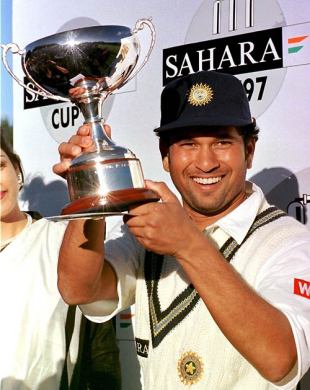
One of the highs of Tendulkar's captaincy, the Sahara Cup in 1997 © AFP
| |
|
What is the secret behind your success as a cricketer?
Plenty of hours on the field, not as many hours in the gym! It is a combination of long practice sessions, workouts and playing as many matches - practice and live - as possible. One important thing my coach Ramakant Achrekar introduced me to was the concept of match temperament. The reason my brother [Ajit Tendulkar] took me to him [Achrekar] was solely because he made all his students play as many practice matches as possible. I would attend my school in the morning, go to the ground in the afternoon and bat at No. 4 in a practice match. That gave me the confidence to go out in the middle and perform in a match and also taught me how to read various situations in a match. Because every afternoon the conditions were different situation, different theme, and I had to bat differently. So all those factors were extremely important in making me the cricketer that I am today, and however much I thank him [Achrekar] it is not enough.
Was opening for the first time a big step?
In 1994 we were playing in Auckland. I was the vice-captain then and just before the ODI I got to know that [Navjot Singh] Sidhu was not fit as he had woken up with a stiff neck. I requested both Azhar [Mohammad Azharuddin] and Ajit Wadekar [captain and coach] to "just give me one opportunity. I'm very confident as in the first 15 overs I can play some big shots. I feel I'll be able to deliver. And if I fail I'll never ever come to you again". They both agreed graciously, and I was able to go out and perform. It helped me as a cricketer because you go out and face the new ball and at the same time you are looking at putting the ball away. Those days the first over one would look to leave as many balls as possible and not lose wickets early on and then gradually accelerate. But things started changing around that time with [Mark] Greatbach in 1992 World Cup and then [Sanath] Jayasuriya in 1996 to play big shots in the first 15 overs and I did the same once I started opening. To do that you had to move in quickly and get in the right position. Overall that decision helped my game because in ODIs I was facing the new ball and batting No. 4 in Test cricket. Overall I was enjoying the balance.
Are you satisfied with your two captaincy stints?
It was a great honour to captain the country. There were some wonderful moments. The very first Test itself was memorable, in Delhi. Then we won the Titan Cup in India against the two toughest opponents - Australia and South Africa. Then, in Toronto, when we beat Pakistan in the Sahara Cup. There were many occasions where we came close to winning, but just couldn't cross the final hurdle. It was an experience full of highs and lows. View Source : Sachin Tendulkar History
